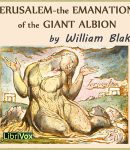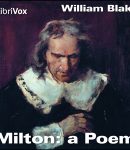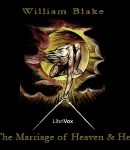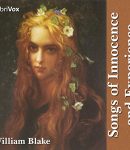
Jerusalem – The Emanation of the Giant Albion
The epic poem Jerusalem was in Blake’s own opinion his masterpiece. It is the last of the great prophetic books. Originally produced as an engraved book of 100 pages (only one copy of which was every fully finished in the colouring), the poem develops and unifies many of the themes Blake had been exploring in earlier works. It is a complex and powerful work, full of dramatic imagery and sublime poetry. You might think of it like a poetic version of a Wagner opera. The edition read here is the first printed version of the poem – which was impossibly hard to read in the original. This then was the first opportunity to really explore it. However in his introduction Blake implies that the way to experience this work is to read it aloud rather than in your head. I can only agree, and I can also understand why few will do it. Although, somewhat inevitably, it is hard to do justice to the original, I hope this will give a flavour of this neglected gem. (Introduction by Nick Duncan) [chương_files]


